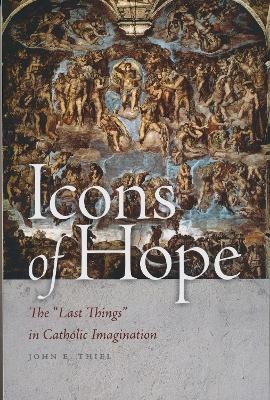
Icons of Hope
The "Last Things" in Catholic Imagination
Seiten
2013
University of Notre Dame Press (Verlag)
978-0-268-04239-4 (ISBN)
University of Notre Dame Press (Verlag)
978-0-268-04239-4 (ISBN)
Icons of Hope presents an interpretation of the last things shaped by the view that the blessed dead in heaven continuously engage in the redemptive task of forgiveness.
In Icons of Hope: The “Last Things” in Catholic Imagination, John Thiel, one of the most influential Catholic theologians today, argues that modern theologians have been unduly reticent in their writing about “last things”: death, judgment, heaven, and hell. Beholden to a historical-critical standard of interpretation, they often have been reluctant to engage in eschatological reflection that takes the doctrine of the “last things” seriously as real events that Christians are obliged to imagine meaningfully and to describe with some measure of faithful coherence. Modern theology’s religious pluralism leaves room for a speculative style of interpretation that issues in icons of hope—theological portraits of resurrected life that can inform and inspire the life of faith.
Icons of Hope presents an interpretation of heavenly life, the Last Judgment, and the communion of the saints that is shaped by a view of the activity of the blessed dead consistent with Christian belief in the resurrection of the body, namely, the view that the blessed dead in heaven continue to be eschatologically engaged in the redemptive task of forgiveness. Thiel offers a revision of the traditional Catholic imaginary regarding judgment and life after death that highlights the virtuous actions of all the saints in their heavenly response to the vision of God. These constructive efforts are fostered by Thiel’s conclusions on the disappearance of the concept of purgatory in large segments of contemporary Catholic belief, a disappearance attributable to the emergence of a noncompetitive spirituality in postconciliar Catholicism, which has eclipsed the kinds of religious sensibilities that made belief in purgatory a practice in earlier centuries. This noncompetitive spirituality—one that recovers traditional Pauline sensibilities on the gratuitousness of grace—encourages an eschatological imaginary of mutual, ongoing forgiveness in the communion of the saints in this life and in the life to come.
In Icons of Hope: The “Last Things” in Catholic Imagination, John Thiel, one of the most influential Catholic theologians today, argues that modern theologians have been unduly reticent in their writing about “last things”: death, judgment, heaven, and hell. Beholden to a historical-critical standard of interpretation, they often have been reluctant to engage in eschatological reflection that takes the doctrine of the “last things” seriously as real events that Christians are obliged to imagine meaningfully and to describe with some measure of faithful coherence. Modern theology’s religious pluralism leaves room for a speculative style of interpretation that issues in icons of hope—theological portraits of resurrected life that can inform and inspire the life of faith.
Icons of Hope presents an interpretation of heavenly life, the Last Judgment, and the communion of the saints that is shaped by a view of the activity of the blessed dead consistent with Christian belief in the resurrection of the body, namely, the view that the blessed dead in heaven continue to be eschatologically engaged in the redemptive task of forgiveness. Thiel offers a revision of the traditional Catholic imaginary regarding judgment and life after death that highlights the virtuous actions of all the saints in their heavenly response to the vision of God. These constructive efforts are fostered by Thiel’s conclusions on the disappearance of the concept of purgatory in large segments of contemporary Catholic belief, a disappearance attributable to the emergence of a noncompetitive spirituality in postconciliar Catholicism, which has eclipsed the kinds of religious sensibilities that made belief in purgatory a practice in earlier centuries. This noncompetitive spirituality—one that recovers traditional Pauline sensibilities on the gratuitousness of grace—encourages an eschatological imaginary of mutual, ongoing forgiveness in the communion of the saints in this life and in the life to come.
John E. Thiel is professor of religious studies at Fairfield University and past president of the Catholic Theological Society of America. He is the author of several books, among which are Senses of Tradition: Continuity and Development in Catholic Faith and God, Evil, and Innocent Suffering: A Theological Reflection.
| Zusatzinfo | 9 Illustrations, color; 9 Halftones, black and white |
|---|---|
| Verlagsort | Notre Dame IN |
| Sprache | englisch |
| Maße | 152 x 229 mm |
| Gewicht | 349 g |
| Themenwelt | Religion / Theologie ► Christentum ► Kirchengeschichte |
| ISBN-10 | 0-268-04239-X / 026804239X |
| ISBN-13 | 978-0-268-04239-4 / 9780268042394 |
| Zustand | Neuware |
| Informationen gemäß Produktsicherheitsverordnung (GPSR) | |
| Haben Sie eine Frage zum Produkt? |
Mehr entdecken
aus dem Bereich
aus dem Bereich
eine Geschichte der christlichen Kunst
Buch | Hardcover (2024)
C.H.Beck (Verlag)
32,00 €
von Athanasius bis Gregor dem Großen
Buch | Softcover (2024)
C.H.Beck (Verlag)
12,00 €


